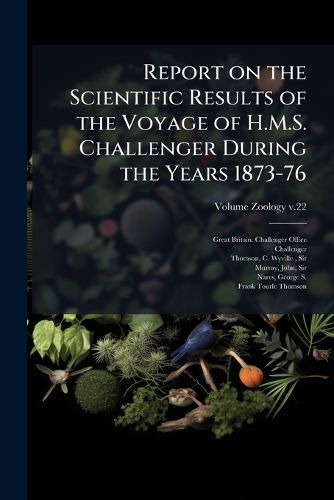Readings Newsletter
Become a Readings Member to make your shopping experience even easier.
Sign in or sign up for free!
You’re not far away from qualifying for FREE standard shipping within Australia
You’ve qualified for FREE standard shipping within Australia
The cart is loading…






This is Volume 22 of the official reports detailing the scientific findings of the HMS Challenger expedition (1873-1876), one of the most comprehensive oceanographic expeditions ever undertaken. Under the command of Captain George S. Nares and Captain Frank Turle Thomson, the HMS Challenger traversed the globe, collecting invaluable data and specimens from the world's oceans.
This volume focuses specifically on zoological findings, presenting detailed analyses and descriptions of newly discovered and previously known animal species. The "Report on the Scientific Results of the Voyage of H.M.S. Challenger" remains a crucial resource for researchers and historians studying the development of oceanography and marine biology, offering a snapshot of the scientific understanding of the late 19th century.
This work has been selected by scholars as being culturally important, and is part of the knowledge base of civilization as we know it. This work was reproduced from the original artifact, and remains as true to the original work as possible. Therefore, you will see the original copyright references, library stamps (as most of these works have been housed in our most important libraries around the world), and other notations in the work.
This work is in the public domain in the United States of America, and possibly other nations. Within the United States, you may freely copy and distribute this work, as no entity (individual or corporate) has a copyright on the body of the work.
As a reproduction of a historical artifact, this work may contain missing or blurred pages, poor pictures, errant marks, etc. Scholars believe, and we concur, that this work is important enough to be preserved, reproduced, and made generally available to the public. We appreciate your support of the preservation process, and thank you for being an important part of keeping this knowledge alive and relevant.
$9.00 standard shipping within Australia
FREE standard shipping within Australia for orders over $100.00
Express & International shipping calculated at checkout
This is Volume 22 of the official reports detailing the scientific findings of the HMS Challenger expedition (1873-1876), one of the most comprehensive oceanographic expeditions ever undertaken. Under the command of Captain George S. Nares and Captain Frank Turle Thomson, the HMS Challenger traversed the globe, collecting invaluable data and specimens from the world's oceans.
This volume focuses specifically on zoological findings, presenting detailed analyses and descriptions of newly discovered and previously known animal species. The "Report on the Scientific Results of the Voyage of H.M.S. Challenger" remains a crucial resource for researchers and historians studying the development of oceanography and marine biology, offering a snapshot of the scientific understanding of the late 19th century.
This work has been selected by scholars as being culturally important, and is part of the knowledge base of civilization as we know it. This work was reproduced from the original artifact, and remains as true to the original work as possible. Therefore, you will see the original copyright references, library stamps (as most of these works have been housed in our most important libraries around the world), and other notations in the work.
This work is in the public domain in the United States of America, and possibly other nations. Within the United States, you may freely copy and distribute this work, as no entity (individual or corporate) has a copyright on the body of the work.
As a reproduction of a historical artifact, this work may contain missing or blurred pages, poor pictures, errant marks, etc. Scholars believe, and we concur, that this work is important enough to be preserved, reproduced, and made generally available to the public. We appreciate your support of the preservation process, and thank you for being an important part of keeping this knowledge alive and relevant.